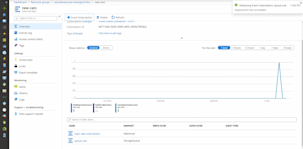Azure Event Grid vs Socket.IO
This Azure Event Grid vs Socket.IO comparison was created based on reviews from developers and our best attempts to perform analysis by looking at documentation and other publicly available resources.
Easily build complete, trusted realtime functionality.
Take our APIs for a spin Azure Event Grid |  Socket.IO | |
|---|---|---|
| Getting started and developer experience | ||
Time to "hello world" Reviewed by 3+ independent developers Ratings were given based on the average amount of time it takes to sign up to a new account and publish the first message. | 4 / 5 5 = <30 min | 4 / 5 5 = <30 min |
Demos / Tutorials A selection of online demos and tutorials so you can test and see the code in action. Explore Ably's tutorials for our pub/sub messaging platform | ||
Documentation Reviewed by 3+ independent developers Explore Ably's documentation for our pub/sub messaging platform | 4.50 / 5 Getting started guides / 5 Information architecture and developer journey / 5 API reference documentation / 5 Readability, design and navigation / 5 Quality of code / 5 Breadth and quality of tutorials / 5 “Azure Event Grid documentation is well organized in terms of information architecture, and the navigation is intuitive. The docs largely consist of quickstart guides, tutorials, samples, and Event Grid concepts. There’s also a useful comparison page with other similar Azure messaging services - Service Bus and Event Hubs. The tutorials are well written, with print screens and code samples throughout. However, they don’t cover the entire breadth of event sources and handlers that can communicate through Event Grid, which would have been incredibly helpful.“ | 4 / 5 Getting started guides / 5 Information architecture and developer journey / 5 API reference documentation / 5 Readability, design and navigation / 5 Quality of code / 5 Breadth and quality of tutorials / 5 "Much like the solution, the documentation is pretty lightweight. You have an excellent getting started guide that requires no prior Socket.IO or Node.js knowledge. There are tens of code snippets throughout the docs, which is fantastic. There are almost no tutorials (not official ones), but you do have a chat and a whiteboard demo that you can grab from GitHub. The quality of writing is good enough. Most of the time, things are clear. Navigating between documentation, demos, and the API reference is quite annoying. They could have done a better job linking these sections and having them displayed in a common ToC. Although lightweight and generally clear, the documentation seems to have some holes in it, based on the number of GitHub and Stack Overflow questions about Socket.IO." |
Dashboard or dev console Reviewed by 3+ independent developers Sign up for free and explore Ably's pub/sub messaging platform | 4.33 / 5 Ease of use / 5 Stats and reports / 5 Functionality / 5  “Azure Portal allows you to configure and monitor event pipelines built with Event Grid. Adding new events and handlers and managing them is easy enough, and the workflow is intuitive most of the time. You can also configure various logs, metrics, and alerts. All in all, the experience is good, but some tooltips would be good, so you don’t have to dig through the documentation if it’s the first time you’re using the service.“ | 1 / 5 Ease of use / 5 Stats and reports / 5 Functionality / 5  "Socket.IO does not provide a developer console or dashboard." |
SDKs Note: Only official SDKs were taken into account. Explore Ably's 25+ SDKs for our pub/sub messaging platform | 6 data plane SDKs Including:
| 1 official Socket.IO server implementation (Node.js), and 4 official client implementations (JavaScript, Java, C++, Swift) Note that there are also several community-made server and client implementations in other languages, such as Python, .NET, and Golang. |
API structure Reviewed by 3+ independent developers | 4.25 / 5 API consistency across SDKs / 5 Well structured / 5 Intuitive / 5 Simple / 5 “Event Grid APIs are split into data plane APIs and management APIs. The management APIs enable you to create, update, and delete Event Grid topics and subscriptions, while the data plane APIs enable you to post events to topics and consume events. The APIs are largely intuitive and consistent across SDKs. They’re also quite easy to use, but you need to familiarize yourself with them first, as there are tens of operations you can perform.“ | 5 / 5 API consistency across SDKs / 5 Well structured / 5 Intuitive / 5 Simple / 5 "Socket.IO has a simple JavaScript-based API interface that has intuitive naming conventions. The API reference documentation is very detailed, with each resource described in detail, and with numerous code examples throughout. It’s easy to get started with both the Server and the Client APIs." |
 Azure Event Grid |  Socket.IO |
|---|---|
| "Hello world" code example | |
| |
 Azure Event Grid |  Socket.IO | |
|---|---|---|
| Realtime features | ||
Pub/Sub messaging Pub/Sub is a design pattern that lets any number of publishers (producers) push messages to channels (also known as topics). Multiple subscribers (consumers) can subscribe to a channel to consume published messages. Explore Ably's pub/sub messaging implementation | Limited You can use the rooms feature to broadcast events to a subset of clients, but this applies exclusively to the server-side (i.e. clients don’t have access to the list of rooms it has joined). You can also use a Redis adapter to broadcast events to clients through the Redis pub/sub mechanism. | |
Message queues A message queue is a form of asynchronous service-to-service communication. Messages are stored on a queue until they are processed. Note that each message is only consumed by one subscriber (consumer). Explore Ably's message queues implementation | ||
Presence Presence enables you to track the online and offline status of devices and end-users in real time and to store their state. Essential for chat apps and multiplayer games. Explore Ably's presence implementation | ||
Message history Message history provides a means to retrieve previously published messages. For this to be possible, message data must be stored (persisted) somewhere. Explore Ably's message history implementation | ||
Connection state recovery (stream resume) In the case of unreliable network conditions, clients may suddenly disconnect.Connection state recovery ensures that when they reconnect, the data stream resumes exactly where it left off. Explore Ably' s connection state recovery implementation | ||
Guaranteed message ordering Ordering ensures that messages are delivered to consumers in the same order that producers publish them. Explore Ably' s guaranteed message ordering implementation | ||
Exactly-once semantics Exactly-once is a system-wide data integrity guarantee that ensures each message is delivered to consumers exactly-once. Explore Ably' s idempotent publishing implementation | ||
Message delta compression Message delta compression enables you to only send the changes from the previous message to subscribers each time there’s an update, instead of the entire message. Useful for use cases where there is a significant degree of similarity between successive messages. Explore Ably' s message delta compression implementation | ||
Native push notifications Native push notifications can be used to deliver messages even when clients are offline. Useful for geolocation updates or news alerts. Explore Ably's push notifications implementation | ||
Webhooks Webhooks provide a mechanism to get messages and other types of events (such as clients entering or leaving channels) pushed to your servers over HTTP. Explore Ably's webhooks implementation | ||
Serverless functions A serverless function is essentially an isolated, single-purpose piece of code that is only executed when it’ triggered by an event. For example, you can use serverless functions to send a welcome message to clients when they become present on chat channels. Note that serverless functions are usually fully managed by cloud vendors. Explore Ably's serverless functions implementation | Limited Only integrates with Azure Functions. Event Grid doesn’t have in-built support for other serverless platforms, such as AWS Lambda or Google Cloud Functions. | |
Built-in integrations Which popular services & systems are Azure Event Grid and Socket.IO integrated with? Explore Ably's library of integrations | Webhooks
Serverless functions
Streaming
| Webhooks
Serverless functions
Streaming
|
Known limits and constraints Find out practical limits, such as the maximum message size, or the maximum number of concurrent connections. Explore the practical limits of the Ably pub/sub messaging platform | Publisher throughput 5.000 events/sec or 1 MB/sec (whichever is met first) per topic Maximum message size 1 MB Maximum number of topics 100.000 topics per event domain Maximum number of subscribers 500 subscriptions per topic | Throughput Unknown Maximum message size Unknown, but the default is 1 MB Maximum number of topics N/A Maximum number of concurrent connections Unknown |
| Supported development platforms, languages, open protocols and cloud models | ||
|---|---|---|
Development platforms & operating systems Which popular development platforms and operating systems do Azure Event Grid and Socket.IO support via official SDKs? Explore the development platforms supported by Ably |
|
|
Languages Which popular programming languages do Azure Event Grid and Socket.IO support via offical SDKs? Explore the programming languages supported by Ably |
|
|
Open protocols Which popular open protocols do Azure Event Grid and Socket.IO support? Explore the open protocols supported by Ably |
|
|
Cloud models Which popular cloud models do Azure Event Grid and Socket.IO support? |
|
|
| Global and reliable edge service | ||
|---|---|---|
Edge messaging network with latency-based routing Latency-based routing ensures that clients are always routed to the nearest datacenter and point of presence. Explore Ably's routing mechanism that mitigates network and DNS issues | N/A | |
Multi-region data replication (message durability) Multi-region data replication (storage) protects against single points of failure and ensures message data durability. Learn how Ably ensures message durability | N/A | |
Uptime SLAs Here’s what the most common SLAs amount to in terms of downtime over a calendar year: 99.999% SLA = 5m 15s downtime per year 99.99% SLA = 52m 35s downtime per year 99.95% SLA = 4h 22m 58s downtime per year 99.9% SLA = 8h 45m 56s downtime per year 99% SLA = 3d 15h 39m 29s downtime per year Source: https://uptime.is/ | 99.99% | N/A |
Quality of Service What QoS guarantees do Azure Event Grid and Socket.IO provide natively? Explore Ably's availability and uptime guarantees for our pub/sub messaging platform |
|
|
| Security | ||
|---|---|---|
API key authentication The simplest way to authenticate. Involves using private API keys that you can usually create and edit via a dashboard. Recommended to be used server-side, as private API keys shouldn’t be shared with untrusted parties. Explore Ably's implementation of API key authentication | N/A | |
Token-based authentication Which popular token-based authentication mechanisms do Azure Event Grid and Socket.IO support? Note that token-based authentication is usually the recommended strategy on the client-side as it provides more fine-grained access control and limits the risk of credentials being compromised. Explore Ably's implementation of token-based authentication |
|
|
Configurable rules and permissions Which types of configurable rules and permissions do Azure Event Grid and Socket.IO support? Explore Ably's configurable rules and permissions |
|
|
Message encryption Which types of message encryption do Azure Event Grid and Socket.IO support? Explore Ably's message encryption mechanisms |
|
|
Formal certifications Which formal certifications are Azure Event Grid and Socket.IO compliant with? Explore Ably's security and compliance for our pub/sub messaging platform |
|
|
| Pricing & Support | ||
|---|---|---|
Free package What do the free packages offered by Azure Event Grid and Socket.IO consist of? Explore Ably's free package for our pub/sub messaging platform | First 100.000 operations free each month. | Socket.IO is a free & open-source solution. |
Pricing model How are the Azure Event Grid and Socket.IO pricing models calculated? Explore Ably's pricing model for our pub/sub messaging platform | Azure Event Grid uses a pay-per-use pricing model based on operations performed. Operations include ingress of events to Domains or Topics, advanced matches, delivery attempts, and management calls. The price per million operations is $0.60 (note that we have used the US as a reference point, but prices may vary across regions). | N/A |
Enterprise package What benefits do the Azure Event Grid and Socket.IO enterprise packages offer? Explore Ably's enterprise package for our pub/sub messaging platform | No Enterprise package | N/A |
Community Reviewed by 3+ independent developers Explore Ably's community support channel for our pub/sub messaging platform | 2 / 5 Presence on multiple channels / 5 Size and activity / 5 “Not much seems to be going on in terms of community. There are around 350 questions on Stack Overflow about Event Grid, but they rarely exceed 30 views, and you're unlikely to find more than one answer to each. It is perhaps one of the lesser-used Azure services”. | 5 / 5 Presence on multiple channels / 5 Size and activity / 5 "Socket.IO is the most popular open-source WebSocket solution. It has a large and very active community. Client SDKs in several different languages? All of them community-made. Troubleshooting and support questions? The community will sort you out, almost always. As you’d expect, Stack Overflow and GitHub are very busy, with tens of thousands of questions, views, and responses about all things Socket.IO." |
Support What types of support options and response times do Azure Event Grid and Socket.IO offer? Explore Ably's support options for our pub/sub messaging platform | General support options Email, support ticket, phone, technical documentation, community support (e.g. forums or StackOverflow). Enterprise support The Professional Direct (ProDirect) plan includes 24/7 support, a Support API (to create & manage support tickets programmatically), and operational & architectural guidance from delivery managers. Response time Within 8 business hours for Developer customers Between 1 and 8 hours initial response time (depending on severity) for Standard and ProDirect customers. | General support options Technical documentation, Slack, Stack Overflow, GitHub. Enterprise support N/A Response time N/A |
Disclaimer: The information presented for Azure Event Grid was last updated on 24 March 2021 and on 7 June 2024 for Socket.IO. It is possible that some details may now be out of date. If you think that’s the case, please let us know so we can update them. In any case, you should not rely solely on the information presented here and must check with each provider before deciding to integrate or buy any of these two solutions.
View more comparisons
More to explore
About Ably
Ably is an enterprise-ready pub/sub messaging platform. We make it easy to efficiently design, quickly ship, and seamlessly scale critical realtime functionality delivered directly to end-users. Everyday we deliver billions of realtime messages to millions of users for thousands of companies.
Compare packages
Documentation
Rapidly build production-ready realtime capabilities with quickstart guides, realtime concepts, and full API reference.
Read the docs
Compare our tech
View more comparisons between Ably and other realtime messaging solutions and see why we are clearly the better choice.
View all comparisons



